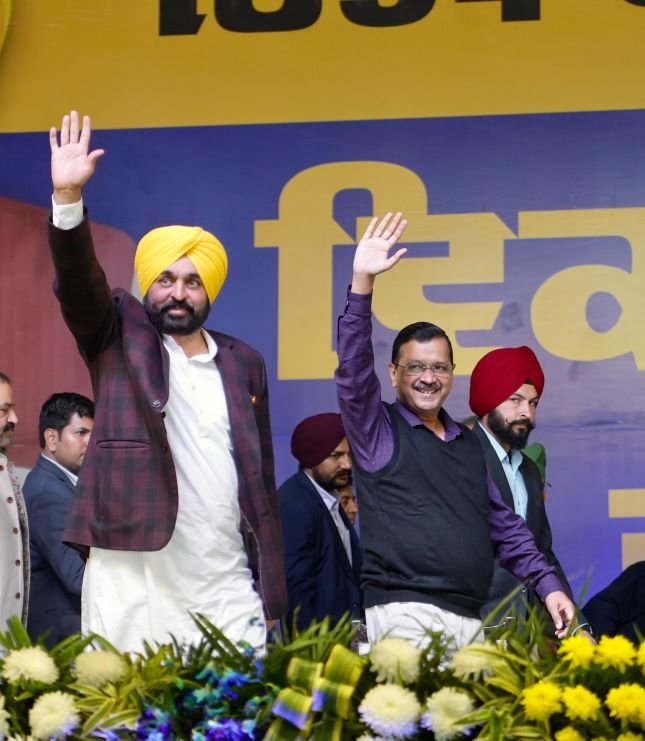Saptrishi Soni: In Punjab’s volatile political landscape, the recent uproar over the land pooling policy has breathed new life into an opposition that, until recently, appeared fragmented and muted after the 2022 Assembly elections. The ruling Aam Aadmi Party (AAP), which had stormed to power with an unprecedented mandate, now finds itself at the receiving end of growing public anger, with opposition parties sensing an opportunity to reclaim political ground just one and a half years ahead of the next Vidhan Sabha polls. The controversy has turned into more than a policy dispute; it has become a test of public trust in a government that rose to power on promises of transparency and people-centric governance but is now being accused of coercion and disregard for farmers’ rights.
The opposition, which had been struggling to mount a serious challenge to AAP since its sweeping 2022 victory, has seized on this controversy with renewed vigor. The Congress, Shiromani Akali Dal (SAD), and the Bharatiya Janata Party (BJP) have all sharpened their attacks on the ruling party, projecting it as authoritarian and out of touch with the ground realities of Punjab’s agrarian base. State Congress chief Amarinder Singh Raja Warring termed the land pooling scheme “a betrayal of Punjab’s farmers” and alleged that the government was bulldozing dissent to push its agenda. SAD leader Sukhbir Singh Badal accused AAP of “using Saam-Dam-Dand-Bhed to suppress voices of resistance” and claimed that this method of governance showed the party’s desperation to cover up its policy failures. The BJP’s Punjab president Sunil Jakhar added that “the people of Punjab are realizing that tall promises of change were hollow, and the state is slipping further into chaos under AAP.”
These sharp statements underline how the opposition, once struggling for relevance, has suddenly found a common ground to connect with disillusioned sections of society. The deployment of “Saam-Dam-Dand-Bhed”—a political strategy of persuasion, inducement, punishment, and division—has become a recurring theme in opposition speeches, with leaders alleging that AAP is resorting to coercive tactics against farmers, while simultaneously attempting to divide communities and buy silence where possible. The repeated references to this age-old political philosophy show how the opposition is building a narrative that paints AAP as manipulative rather than transformative.
The timing of this controversy is critical. Barely eighteen months remain before the state goes to polls again, and the public anger witnessed in protests, highway blockades, and market shutdowns across several districts has given the opposition a readymade issue to galvanize its cadres. Rural Punjab, which had overwhelmingly supported AAP in 2022, now appears restless. Farmers, traders, and local communities who once placed faith in the new party’s clean image are questioning whether it has merely replaced the old order with a new version of high-handedness. For the opposition, this disillusionment is fertile ground to rebuild lost credibility.
The larger political significance lies in how this episode is reshaping Punjab’s opposition unity. While in the past, Congress, SAD, and BJP leaders spoke in different registers, they are now echoing a similar refrain against the ruling party. Publicly, they continue to battle for their own space, but behind the scenes, the realization has dawned that unless AAP is checked, it could dominate Punjab politics for a decade. The land pooling controversy, therefore, has become not just about land but about political survival, strategy, and positioning.
The protests on the streets have been accompanied by a new vigor in legislative discourse. Opposition MLAs have accused the government of “arrogance” and “betrayal,” reminding people that such policies were once the hallmark of regimes that AAP itself opposed. This narrative reversal is particularly damaging for AAP because it undermines its identity as a party of the common people. When the Akalis accuse AAP of behaving like the Congress of old, and when Congress leaders describe AAP’s governance as reminiscent of Akali-era arrogance, it reveals a deepening consensus across party lines that AAP’s image is faltering.
For AAP, the challenge now is to navigate this crisis with damage control that goes beyond rhetoric. Simply suspending officials or shifting administrative blame may not suffice, as the opposition continues to hammer the narrative that the government has lost moral legitimacy. The coming months will determine whether this is a temporary storm or the beginning of a steady erosion of AAP’s political capital in Punjab. With elections just a year and a half away, the opposition’s renewed energy, bolstered by “Saam-Dam-Dand-Bhed” rhetoric and widespread public anger, signals that the political battle in Punjab is entering a new, high-stakes phase.
#PunjabPolitics #AAP #Congress #SAD #BJP #LandPoolingPolicy #PunjabElections #FarmersProtest #SaamDamDandBhed




